The Value of Diversity
The second edition of Dive - in-depth training activity took place from November 30th to December 2nd in Ilhavo (Portugal). It was co-organised by Circostrada Network and Bússola (Portugal), in collaboration with 23 Milhas, Município de Ílhavo and Acesso Cultura in the frame of LEME - Festival de Circo Contemporâneo. Here is a quick review of these three days by Jordi Duran i Roldós, director of Festival Z for young creators in Girona and coordinator of the Degree in Performing Arts at the ERAM-University of Girona, as well as a panelist and an enthusiastic participant of Dive#2.
Both DIVE#2 and LEME’s artistic programme were deeply connected with Circostrada Network’s annual red-thread “Diverse body/ies”. DIVE#2 was a three-day immersive event dedicated to reflecting on equality, diversity, accessibility and power dynamics within the field of circus and outdoor arts. Through a wide range of experiential activities, the participants were able to share knowledge, experiences and best practices related to these particular issues.
As for me, I was invited by Circostrada Network to be a panellist in one of the debates and as well as to write this article. Now, back at home, and trying to process all that we have experienced, I can tell you that I now have even more questions than I had before I left for Ílhavo! But judge for yourselves.
Both the artistic programming of LEME Festival and the activities of the DIVE#2 programme run smoothly. The agenda was quite packed but artists, mediators, audiences and guests were, in general, quite satisfied by the outcome (it is a must to especially thank the know-how and sense of humour of Stéphane Segreto-Aguilar, Circostrada coordinator and hilarious MC; as well as the inexhaustible patience and emotional intelligence of the Bússola team, Bruno Costa and Daniel Vilar).
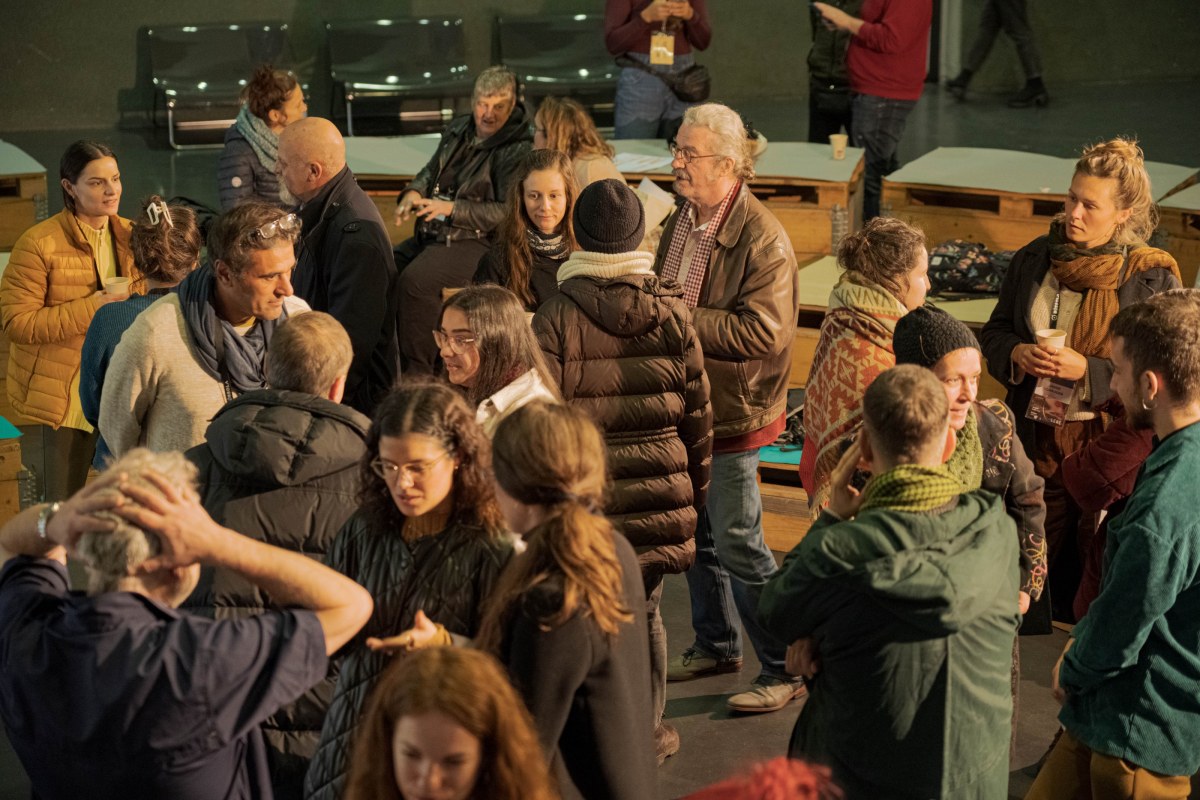
On the afternoon of Wednesday the 30th of November, after the welcome words at the Foyer of the Casa da Cultura de Ílhavo, the participants were reminded by the coordinators of the event to be kind, to share generously and try to understand all points of view. We started a meeting that presented very complex questions to professionals from different countries and backgrounds. And indeed, the three days of talks were carried out in a respectful way, putting listening and care at the centre of the debates.
The starting shot was done by Yamam Al-Zubaidi, an independent researcher specialised in European and Swedish equality law with focus on equality data, race and ethnicity as well as the cultural sector. For Al-Zubaidi, today diversity as a concept has no lineal definitions. In Europe, each country understands, regulates, does research and implements attention to diversity differently. For him, diversity has a lot to do with taking risks and the rise of wider respect for human rights. But as far as the world of performing arts is concerned, he put on the table the need to ask ourselves why it is important to promote diversity, why our project needs more diversity, and why diversity should be central in the shows we program or sell. To conclude, and beyond the need of representing diversities on the stages, he emphasised that the value of diversity was the value of the “mixture”, and that cultural institutions had to assume the risk of sharing power and decisions with their communities, the ones existing and the ones to exist.
In my opinion, however, the headline of the first day was given by the protagonist of the second talk, the artist Diana Niepce. According to her, inclusion is also an act of exclusion. We have been talking about inclusion for so long that I personally had not noticed this fact. Dichotomous thinking always generates tensions. She was spot on.
The time we shared with Niepce was a conversation conducted by the choreographer, performing arts curator and teacher, Cristina Planas Leitão. During forty-five minutes, Niepce shared her life story with the audience and took us through issues that had to do with honesty with ourselves and with others; the subversion of limits, the acceptance or the understanding of a non-normative body in contemporary performing arts; the lack of non-normative bodies in drama schools and, consequently, the need to see more political bodies on the stages that help to change the vision of our societies, among other considerations.
The professional activities of the first day culminated in an ice-breaking and networking session where old acquaintances and strangers were able to get into the topic and mingle in a relaxed way while answering an express performative questionnaire. Incredibly, in one hour we were able to have up to three minutes of conversation with twelve different people. I can assure you that this caffeinated dynamic made us laugh for a while, but also invited us to start redefining a position in front of some of the questions that we would be discussing for the rest of the days.
Before starting it, the second day seemed to be the busiest. How can you digest four shows and three debate and reflection activities in just twelve hours? Well, the efficacious planning by the event’s co-organisers worked miracles: the day was so inspiring, especially regarding the panel discussions.
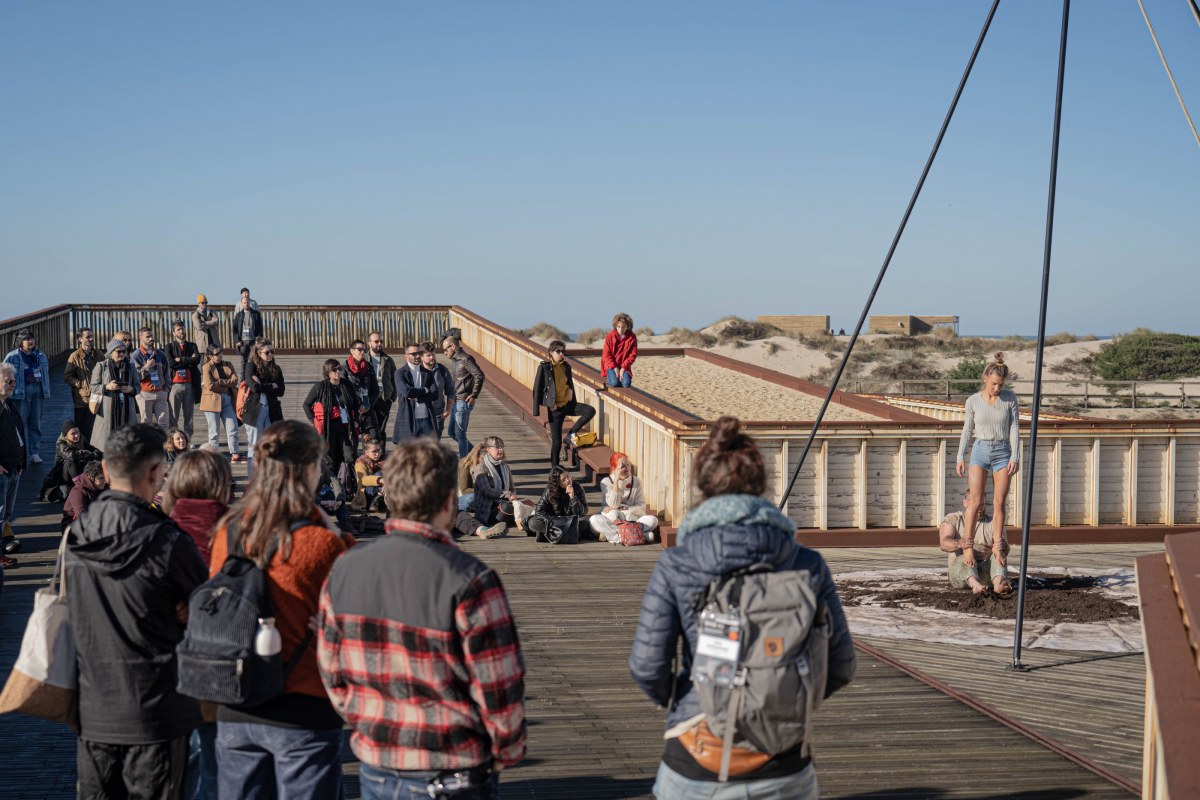
The first part of the day took place in an idyllic context, the creation centre Cais Criativo Costa Nova, located a few metres from the wild beaches of the Atlantic Ocean. During the time we spent there, more than one took advantage of the opportunity to get their feet wet a little and thus activate the blood circulation before we sat again for another long time.
Without a doubt, the round table that generated most passionate reactions among the whole DIVE#2 meeting was the first one of the second day. It was dedicated to attempts to include DEIA (Diversity, Equity, Inclusion, Accessibility) in cultural practices. What worked, what didn't, and why? What have we learned and what can we change in the future? The panellists were Catarina Saraiva (Linha de Fuga), Cláudia Berkeley (Teatro da Didascália), Marco Paiva (Terra Amarela) and Maria Capell Pera (FiraTàrrega), meanwhile the discussion was facilitated by Stéphane Segreto-Aguilar. Their contributions were all related to the art of failure, to error as a motor of change and as a learning space. The debate was focused on the need to generate mediation strategies able to improve creative processes when dealing with diversity and accessibility. There was also a lot of discussion on the importance of reciprocity and continuity, and on the need for decolonial views when it comes to international collaborations. Of everything we talked about, however, I stand by Maria Capell's comment when, referring to her experience, she said that she is aware that there are things she does not know. Being conscious that we need help is a good starting point. To understand complexity, complex approaches are required. Then, why don’t we create transprofessional teams? Why don’t our organisations give place to those who are still not represented in? Why don’t we give us more time?
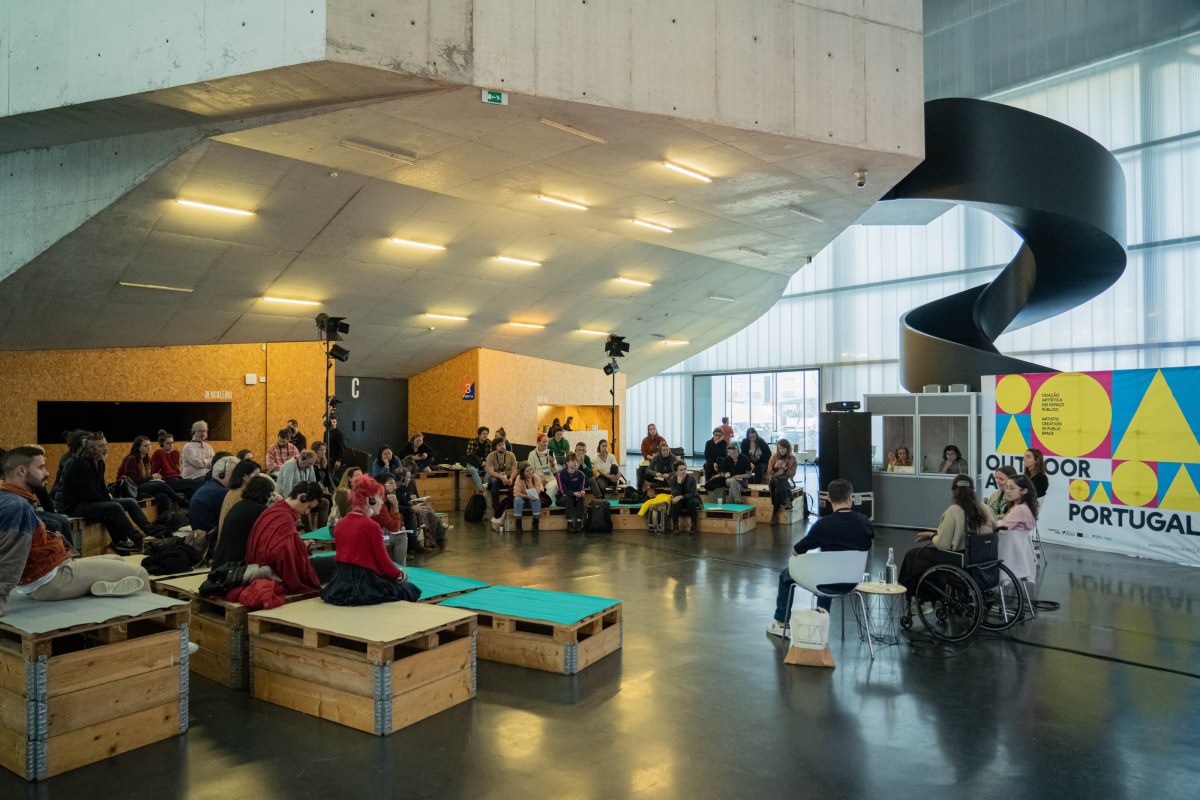
After lunch, the discussions continued in the Casa da Cultura de Ílhavo. The first one was a conversation between performer Paulo Azevedo, actress Inês Cóias and dance artist Mickaella Dantas with the about the artistic and cultural careers of professionals with disabilities. It was moderated by Maria Vlachou, founding member and Executive Director of Acesso Cultura. The second one was called an ‘Artistic provocation’, and it was a tête-à-tête between dancer and circus performer Sérgio Conceição and interdisciplinary performer Darya Efrat on their artistic work and focused on the dimensions of diversity and inclusion.
The conversation with Conceição and Efrat was interesting, light-hearted and focused on their life and identity as creators. However, the discussion between the artists with disabilities contributed to continue opening core questions already formulated earlier. Their experience enriched and nuanced them, and it is worth sharing them: with regard to young disabled people, are our theatres representing them on and behind the scenes? And, when they are represented, how is it done? What percentage of people with disabilities act, direct, choreograph... in the shows programmed in our theatres, festivals, etc? Why are diverse bodies still unrepresented? Why is the industry not braver? And when we talked about performing arts education, many other questions arose: how many diverse bodies graduate from drama schools each year? What are the careers of disabled professionals like? Is the market prepared to welcome them? What about their employment contracts, or their salaries? Are there differences in working conditions with people disabled and not disabled? Are the theatres adapted to non-normative bodies?
The fact is that we already knew the answer to many of those questions. But the impact of the speakers, as well as the dose of generosity and common sense they put into the talk, did not leave anyone indifferent. Playhouses are beginning to be prepared to welcome audiences with disabilities, but not yet creators. It is necessary to adapt the dressing rooms, access for performers, and many other architectural barriers to overcome. It is also urgent that drama schools adapt their curricula in so many levels. And, among them, it is not only the fact of accompanying diversity during an artist's training stage, it is also mainly how we prepare students to face the nature of what will happen next: a contemporary market destined to perpetuate itself based on neoliberal, ableist, and heteronormative formulas that avoid everything that has to do with the complexity of who we are as human beings, and of the complex world in which we live.
The last day started in the Casa da Cultura de Ílhavo with a round table centred on the topics of public space, participation and audience engagement strategies. The speakers were Alfonso Pato (Festival de Cans), Janne Schröder (PELE - Espaço de Contacto Social e Cultural) and myself, Jordi Duran i Roldós (ERAM – University of Girona & Festival Z), and facilitated by Bruno Costa (Bússola). Of all the talks, this was perhaps the most participative. The DIVE#2 organisers used digital tools to build an interactive wall where the public could express themselves at different times. We also performed a small survey, which made us change where we were sitting, moving to one side of the room if we believed that outdoor arts were synonymous with accessibility and to the other side if we believed the opposite. Lived from the inside, this panel focused on the experiences of the professional projects of the three guests. All of them were great formulas and loaded with good intentions, but perhaps complicated to replicate. Or maybe not? Nevertheless, and going back to the keynote by Yamam Al-Zubaidi, we shall not forget who we are doing performing arts for and why. And if we really want the audience to experience our initiatives. Art is a public activity, orientated to the debate and to the confrontation with the others. But us, as the French philosopher Jacques Rancière insinuates in The emancipated spectator*, artists and intellectuals, we should be liberated, freed from the burden we feel when we believe we are saviours and destined to instruct and make active the ignorant and passive spectators.
I also think it is important to highlight that during this discussion a consensus emerged between us, the speakers, on the fact that there are no magic formulas to generate new audiences. Michael Warner **, American literary critic and social theorist, said that the public should not be lured or manipulated. The public must be generated in open and unpredictable ways, on the same discursive process and in the act of being interpellated. He understands the audience as a project, as the potential to build something that does not yet exist. The non-preexistence of an audience allows us to think about the possibility of reconstructing a critical cultural public sphere.
To end, we also agreed that outdoor arts can be accessible, but they do not necessarily reach everyone. No matter how much we bring shows outdoors, if they cannot be enjoyed by people beyond their abilities and don’t represent or challenge us in some way, we cannot say that they reach everyone. We shall respect the rights of the performing arts professionals, but also the rights of the audience, especially the cultural ones, that are often belittled.
And after these many considerations, more and less open questions and other thoughts, we concluded the second edition of DIVE. In the afternoon of the last day in Ílhavo we were able to enjoy more shows and little by little we said good-bye to each other, asking when we would see each other again (maybe next September in Paris at FRESH, while celebrating the 20th anniversary of Circostrada Network) and wishing us happy holidays. The best thing about these meetings, without a doubt, is the warmth of this family of professionals and cultural structures who have been together for a long time (while meeting new people all the time). At a time when the political situation in the world is distressing and concerns us profoundly at many levels, I think there is a lot of life and hope in events like DIVE and in the organisations like Circostrada or Bússola. That said, and quoting verbatim from the end of Yamam Al-Zubaidi's presentation: keep calm, ask why and share the pie. See you soon!
* Rancière J. (2008). Le spectateur émancipé. La fabrique éditions
** Warner M. (2002). Publics and counterpublics. Zone Books
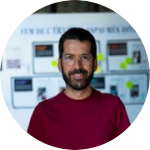
Jordi est diplômé en philologie catalane et hispanique de l’Université de Gérone, et titulaire d’une maîtrise en éducation inclusive de l’Université de Lérida, de l’UVic-UCC (Université de Vic – Université centrale de Catalogne) et de l’Université des îles Baléares. Il a également suivi des cours de direction artistique et de dramaturgie à l’ESAD (École supérieure d’art dramatique). En tant que responsable culturel, Jordi a été directeur artistique du festival FiraTàrrega (2011-2018) et codirecteur de la maîtrise en création d’arts de la rue pour l’Université de Lérida Lleida et FiraTàrrega (2013-2017). En tant que professeur et chercheur, il a coopéré avec la maîtrise en gestion culturelle de l’Université internationale de Catalogne (2010-2017). En tant que metteur en scène et dramaturge, Jordi a récemment collaboré avec des créatrices telles que Virginia Fochs, Marga Socias, Carla Rovira, Marie Gyselbrecht et Catalina Carrasco (compagnie de danse Baal), ainsi qu’avec la compagnie El Pot Petit. Il est actuellement le directeur du Festival Z pour jeunes créateurs à Gérone, mais également coordinateur du diplôme d’arts du spectacle du centre ERAM de l’Université de Gérone.



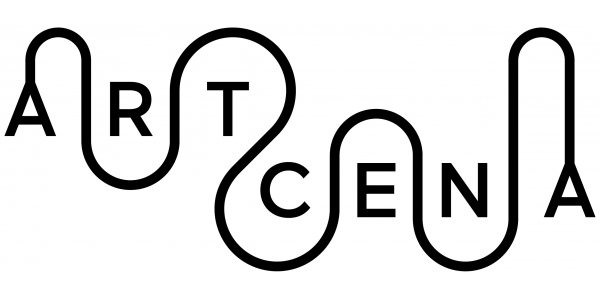

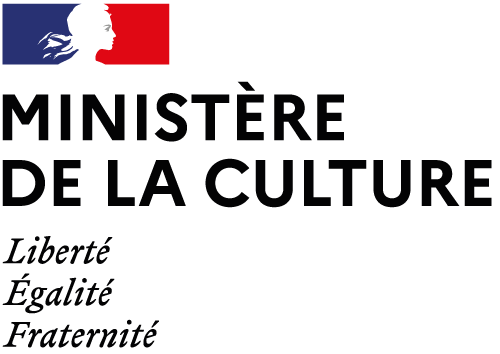
write us: infocircostrada@artcena.fr